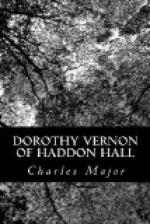They, and the events of their lives, their joys and sorrows, their virtues and sins, their hatreds, jealousies, and loves—the seven numbers in the total sum of life—pass before me as in a panorama, moving when I bid them move, pausing when I bid them pause, speaking when I bid them speak, and alas! fading back into the dim gray limbo of the past long, long ere I would have them go.
But hark! my radiant shades are about to speak. The play is about to begin.
Dorothy Vernon of Haddon Hall
CHAPTER I
I RIDE DOWN TO HADDON
Since I play no mean part in the events of this chronicle, a few words concerning my own history previous to the opening of the story I am about to tell you will surely not be amiss, and they may help you to a better understanding of my narrative.
To begin with an unimportant fact—unimportant, that is, to you—my name is Malcolm Francois de Lorraine Vernon. My father was cousin-german to Sir George Vernon, at and near whose home, Haddon Hall in Derbyshire, occurred the events which will furnish my theme.
Of the ancient lineage of the house of Vernon I need not speak. You already know that the family is one of the oldest in England, and while it is not of the highest nobility, it is quite gentle and noble enough to please those who bear its honored name. My mother boasted nobler blood than that of the Vernons. She was of the princely French house of Guise—a niece and ward to the Great Duke, for whose sake I was named.
My father, being a younger brother, sought adventure in the land of France, where his handsome person and engaging manner won the smiles of Dame Fortune and my mother at one and the same cast. In due time I was born, and upon the day following that great event my father died. On the day of his burial my poor mother, unable to find in me either compensation or consolation for the loss of her child’s father, also died, of a broken heart, it was said. But God was right, as usual, in taking my parents; for I should have brought them no happiness, unless perchance they could have moulded my life to a better form than it has had—a doubtful chance, since our great virtues and our chief faults are born and die with us. My faults, alas! have been many and great. In my youth I knew but one virtue: to love my friend; and that was strong within me. How fortunate for us it would be if we could begin our life in wisdom and end it in simplicity, instead of the reverse which now obtains!




